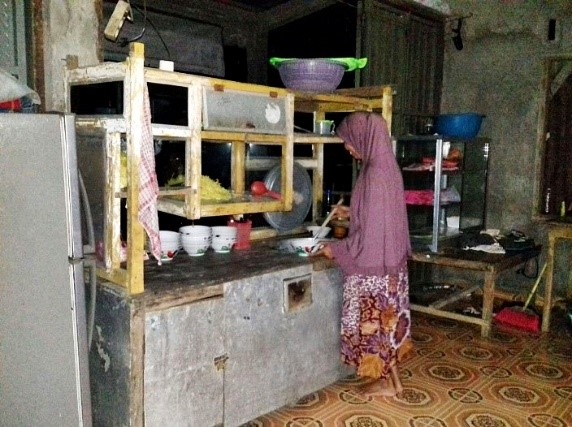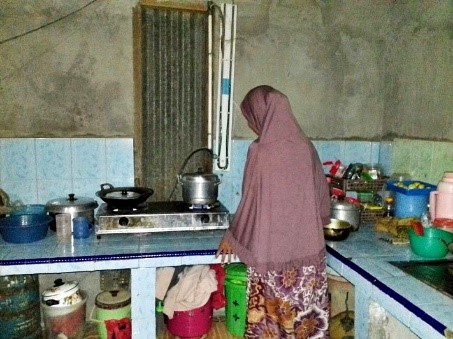Biogas Saves the Livelihood of Meatball Hawker Stall

Mr. Raba Daeng Emba lives in Tombolo Hamlet, Tompobolu Village, Tompobolu Subdistrict, Maros District, South Sulawesi Province. He is the head of family with four children and his occupation is a truck driver and cattle farmer, while his wife, Mrs. Daeng Ati, is a housewife. They run a side business where they have been managing the business for the last 10 years by opening a meatball hawker stall.
They open the business seven days a week hoping that there will be customers dropping by and dine in their place. One day there is a scarcity in LPG supply which forced them to switch to firewood for cooking purposes in order to keep their business running. While on the other side, they have to add extra working time to look for firewood in the forest. However, this effort does not take long as Mr. Raba Daeng Emba as the head of the family cannot abandon his primary livelihood as the truck driver, thus they have to shut down their stall temporarily.
After several month of suspending their hawker stall, they started to look for solution in order to deal with the LPG scarcity and not relying on the firewood supply. One time, Mr. Raba Daeng Emba received an information from one of his neighbors who was looking for candidate biogas users.

Initially, he did not wish to be a biogas users as many people said that biogas is unsuitable for cooking. It is said that food cooked with biogas will be left with the odor of the cow manures.
However, the explanation of Mr. Baktiar, one of the caretaker and construction partner of Domestic Biogas (BIRU) at Maros District, convinced him and he finally agreed to build biogas reactor facility in his home.
Several days after the meeting, he started to dig a hole in preparation for the biogas reactor construction. Upon completion of the biogas reactor construction and initial period of cow manures feeding as the raw material of the biogas which took about three weeks, the biogas was finally ready to use as the source of fuel for cooking purposes.
He was then able to counter the statement of the surrounding community about biogas being unsuitable as the source of fuel for cooking purposes..
By relying on the biogas generated from the conversion of cow manures, his meatball hawker style which had been temporarily suspended was ready for operation. The difference is that it does not rely on LPG or firewood supplies anymore.
After running the business for a month, Mr. Raba Daeng Emba felt that he is able to generate more profit as he does not rely on the supply of LPG anymore. The price of LPG is relatively expensive at Rp 25,000 for a 3-kg capacity cylinder. Additional benefit includes cleaner cow shades and no more disruption by the odor emitting from the shade to the surrounding environment of the hawker stall. He also receives a free organic fertilizer produced by the biogas reactor. (Zaenal H.M)

